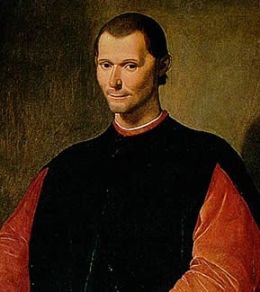Authors - Niccolo Machiavelli
Brief Biography
Niccolo di Bernardo dei Machiavelli (3 May 1469 - 21 June 1527) was an Italian historian, diplomat, philosopher, humanist and writer based in Florence during the Renaissance. A founder of modern political science, he was a diplomat, political philosopher, playwright, and a civil servant of the Florentine Republic. He also wrote comedies, carnival songs, and poetry. His personal correspondence is renowned in the Italian language. He was Secretary to the Second Chancery of the Republic of Florence from 1498 to 1512, when the Medici were out of power. He wrote his masterpiece, The Prince after the Medici had recovered power and he no longer held a position of responsibility in Florence, and is respectively interpreted by many as a satire of these powers. - Wikipedia
For the great majority of mankind are satisfied with appearances as though they were realities. and are often more influenced by things that seem than by those that are.
Government consists in nothing else but so controlling subjects that they shall neither be able to, nor have cause to do it harm.
Ambition is so powerful a passion in the human breast, that however high we reach we are never satisfied.
There are three kinds of intelligence: one kind understands things for itself, the other appreciates what others can understand, the third understands neither for itself nor through others. This first is excellent, the second good, and the third useless.
Men rise from one ambition to another. First they seek to secure themselves from attack, and then they attack others.
It must be remembered that there is nothing more difficult to plan, more doubtful of success nor more dangerous to manage than the creation of a new system. For the initiator has the enmity of all who profit by the preservation of the old institution and merely lukewarm defenders in those who would gain by the new one.
Occasionally words must serve to veil the facts. But this must happen in such a way that no one becomes aware of it; or, if it should be noticed, excuses must be at hand, to be produced immediately.
War should be the only study of a prince.
It is better to be bold than too circumspect, because fortune is of a sex which likes not a tardy wooer and repulses all who are not ardent.
Rome remained free for four hundred years and Sparta eight hundred, although their citizens were armed all that time; but many other states that have been disarmed have lost their liberties in less than forty years.
Rhis is to be asserted in general of men: that they are ungrateful, fickle, false, cowardly, covetous, and as long as you succeed, are yours entirely; they will offer you their blood, property, life, and children...when the need is far distant; but when it approaches, they will turn against you.
If an injury has to be done to a man it should be so severe that his vengeance need not be feared.
A prince should therefore have no other aim or thought, nor take up any other thing for his study but war and it organization and discipline, for that is the only art that is necessary to one who commands.
There are three classes of intellects: one which comprehends by itself; another which appreciates what others comprehend; and a third which neither comprehends by itself nor by the showing of others; the first is the most excellent, the second is good, and the third is useless.
When neither their property nor their honor is touched, the marjority of men live content.
War cannot be avoided; it can only be postponed to the other's advantage.
Men judge generally more by the eye than by the hand, for everyone can see and few can feel. Every one sees what you appear to be, few really know what you are.
Whoever desires to found a state and give it laws, must start with assuming that all men are bad and ever ready to display their vicious nature, whenever they may find occasion for it.
Men shrink less from offending one who inspires love than one who inspires fear.
There is no avoiding war; it can only be postponed to the advantage of others.
Politics have no relation to morals.
Men rise from one ambition to another: first, they seek to secure themselves against attack, and then they attack others.
Since love and fear can hardly exist together, if we must choose between them, it is far safer to be feared than loved.
No enterprise is more likely to succeed than one concealed from the enemy until it is ripe for execution.
He who has not first laid his foundations may be able with great ability to lay them afterwards, but they will be laid with trouble to the architect and danger to the building.
There is no other way of guarding oneself against flattery than by letting men understand that they will not offend you by speaking the truth; but when everyone can tell you the truth, you lose their respect.
He who blinded by ambition, raises himself to a position whence he cannot mount higher, must thereafter fall with the greatest loss.
